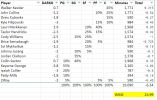Several years ago, during the Core 4 days of Utah Jazz lore, an idiotic theory was going around SLC.dunk that for young players to properly develop they needed to have at least 2000 of NBA playing time in a year.
While I think it's fair to say that theory was overblown, it's interesting to note, given ideas about playing time for young players and desiring players on similar timelines, that there have only been 3 teams in NBA history to have 5 players 24 and younger (according to NBA.com's stats) that have received over 2000 minutes in a single (same) year. It's not an easy feat, what with injuries and other priorities. Among our 24 and under players only Keyonte surpassed 2000 minutes last year (and just barely). As a point of comparison, 104 players regardless of age played over 2000 minutes last season in the league (about 3.5 per team on average).
What are your hopes/expectation for minutes played for the young guys this year? Do we have a chance to have 5 players 24 and under receive 2000+ minutes for only the 4th time in NBA history? We have 8 players of the appropriate age (Collier, Williams, Filipowski, George, Hendricks, Sensabaugh, Kessler, Juzang). How many minutes do you think they need (overall, or per game) to develop properly? How many do you think they'll get?
Bonus points for anyone who can identify the three earlier teams/coaches.
While I think it's fair to say that theory was overblown, it's interesting to note, given ideas about playing time for young players and desiring players on similar timelines, that there have only been 3 teams in NBA history to have 5 players 24 and younger (according to NBA.com's stats) that have received over 2000 minutes in a single (same) year. It's not an easy feat, what with injuries and other priorities. Among our 24 and under players only Keyonte surpassed 2000 minutes last year (and just barely). As a point of comparison, 104 players regardless of age played over 2000 minutes last season in the league (about 3.5 per team on average).
What are your hopes/expectation for minutes played for the young guys this year? Do we have a chance to have 5 players 24 and under receive 2000+ minutes for only the 4th time in NBA history? We have 8 players of the appropriate age (Collier, Williams, Filipowski, George, Hendricks, Sensabaugh, Kessler, Juzang). How many minutes do you think they need (overall, or per game) to develop properly? How many do you think they'll get?
Bonus points for anyone who can identify the three earlier teams/coaches.

